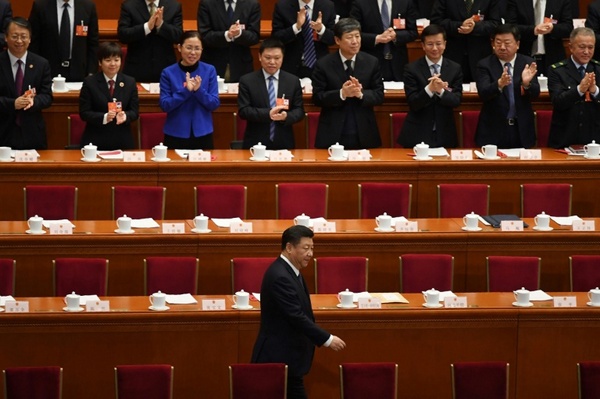
Chinese President Xi Jinping was applauded as he arrived for the key vote at the National People’s Congress /AFP
China abolishes presidential term limit
China’s Xi Jinping on Sunday secured a path to rule indefinitely as parliament abolished presidential term limits, handing him almost total authority to pursue a vision of transforming the nation into an economic and military superpower.
The move reverses the era of “collective” leadership and orderly succession that was promoted by late paramount leader Deng Xiaoping to ensure stability following the turbulent one-man rule of Communist China’s founder Mao Zedong.
The historic constitutional amendment breezed through the rubber-stamp parliament with 2,958 in favor, two against and three abstentions despite an unusual bout of online criticism that censors have scrambled to extinguish.
Xi stood up first at the imposing Great Hall of the People in Beijing to cast his paper ballot in a red box, as delegates of the National People’s Congress applauded after each vote on the constitutional amendment to lift the two five-year term limit for the presidency.
The first constitutional amendment in 14 years had been expected to breeze through the legislature, which has never rejected a Communist Party diktat in its half-century of existence.
“This is the urgent wish of the common people,” Ju Xiuqin, a delegate from northeastern Heilongjiang province, told AFP, echoing party claims that the amendment had the unanimous support of “the masses.”
Xi, 64, has consolidated power since 2012 when he was appointed to the country’s top office: general secretary of the Communist Party.
While the position has no term limits, his two predecessors both gave it up after two terms as part of an orderly process established by Deng.
‘Soft coup’
The country’s presidency is a largely ceremonial office, but the constitutional limits meant Xi would have had to give it up in 2023.
But with the new amendments, he could now have a lifetime to push his goal of turning China into global economic powerhouse with a “world-class” military by mid-century.
His rise has been accompanied by tighter restrictions on civil society, with the detention of activists and lawyers, and stricter limits on the already heavily controlled internet.
At the same time, he gained a measure of popularity among Chinese people through a relentless crackdown on corruption that has punished more than a million party officials, and sidelined potential rivals.